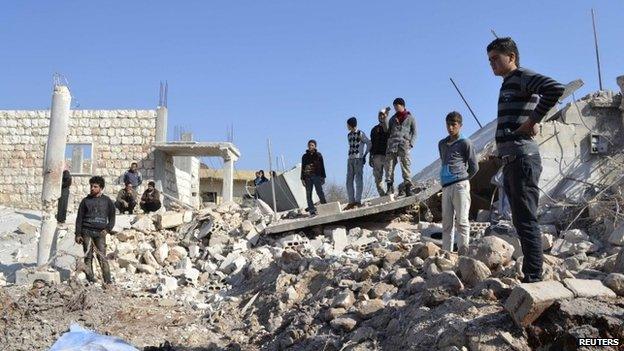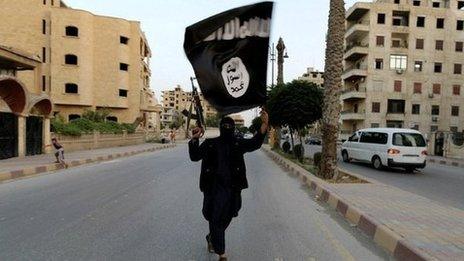Human Rights Watch: 'Ignoring abuses will fuel IS'
- Published

The brutal tactics of IS have provoked widespread revulsion
Governments' tendencies to ignore human rights in the face of security threats is not just wrong, but also counter-productive, Human Rights Watch says.
The organisation's annual world report said the rise of Islamic State (IS) "did not emerge in a vacuum" but was the result of regional abuses.
It said Iraq's and Syria's governments had created fertile ground for IS.
It also blamed the US for ignoring the abuses and concentrating solely on its military battle against IS militants.
"Human rights violations played a major role in spawning or aggravating most of today's crises," argued Kenneth Roth, director of the US-based watchdog, as Human Rights Watch (HRW) unveiled its 660-page World Report 2015 , external.
But while the world may seem to be "unravelling," many governments "appear to have concluded that today's serious security threats must take precedence over human rights", he said.
"In this difficult moment, they seem to argue, human rights must be put on the back burner, a luxury for less trying times," he said. However, shelving them is "not only wrong, but also short-sighted and counterproductive", he said.

Atrocities in Syria have been largely ignored by the UN Security Council, the report says
Four years after the arrival of the "Arab Spring" brought hopes for a new era of justice in the Middle East, the report makes grim reading, the BBC's Jim Muir reports from Beirut, where the report was presented.
The report singles out many countries in the region - especially Iraq, Syria and Egypt - for trampling on human rights in the name of facing security challenges which it argued themselves had their roots in abuses of power.
Rise of IS
The dramatic arrival of IS had led to a subordination of human rights, the report said, adding: "Rarely has an armed force engendered such widespread revulsion and opposition."
However, the abusive sectarian polices pursued by the Iraqi government, and the "atrocities" inflicted on civilians by the Assad regime in Syria, had been "important factors in fuelling" IS, the report said.
And the regional governments were not the only ones to blame, HRW said.
In Iraq, the US-led 2003 invasion had left a security vacuum and there had been subsequent "international indifference" to abuses by the Iraqi government, the report said.
Meanwhile, it said, in Syria, the US and its allies had allowed military action against IS to "overshadow" efforts to get Damascus to end abuses.
"This selective concern allows Isis recruiters to portray themselves to potential supporters as the only force willing to stand up to Assad's atrocities," the report said, using another acronym for the IS militant group.
As for Egypt, the report said the crushing of the Muslim Brotherhood sent the message to political Islamists that there was no point going to the polls, because they would be repressed anyway.
"Rather than treating human rights as a chafing restraint, policymakers worldwide would do better to recognise them as moral guides offering a path out of crisis and chaos," Mr Roth concluded.
- Published11 August 2014

- Published28 March 2018

- Published17 June 2014

- Published9 September 2014

- Published30 June 2014
